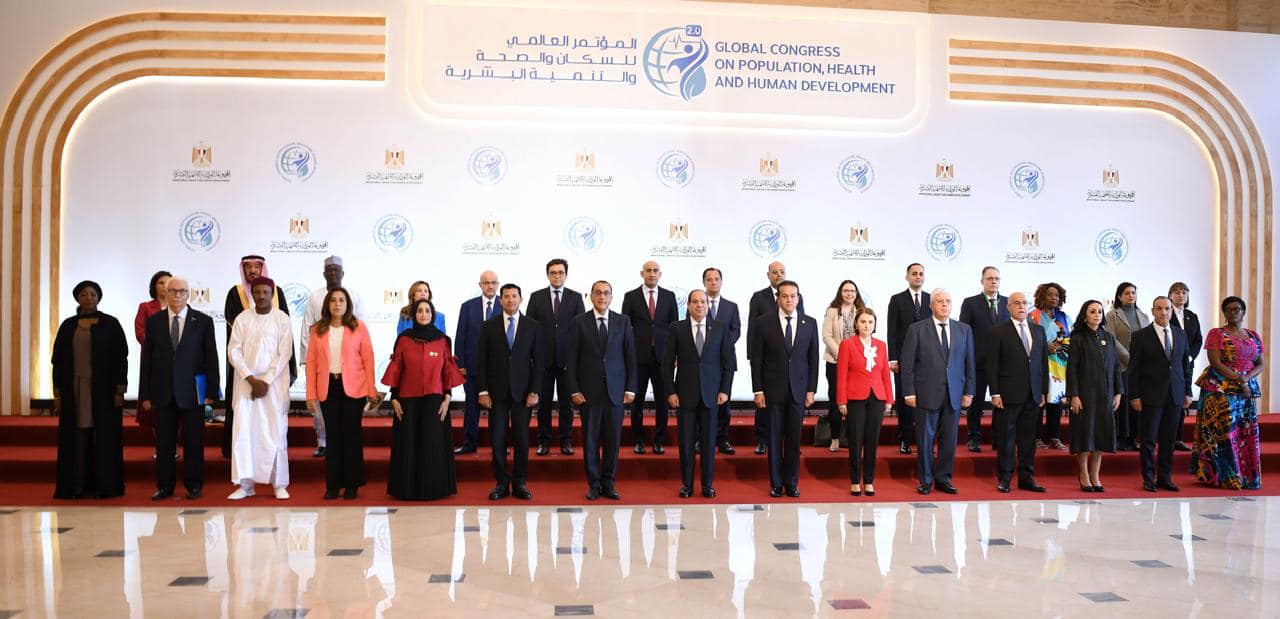
Egypt's President Abdel Fattah El-Sisi attends the 2024 Global Congress on Population, Health and Human Development in the New Administrative Capital - Presidency
CAIRO – 20 October 2024: President Abdel Fattah El-Sisi highlighted on Sunday Egypt’s program with the International Monetary Fund (IMF), noting that the country may “review the situation” with global lender if the ongoing challenges pose unbearable burden on the public.
Speaking at the 2024 Global Congress on Population, Health and Human Development hosted by the New Administrative Capital, east of Cairo, Sisi said Egypt has lost about $6-7 billion in the last 10 months amidst ongoing regional and global repercussions.
He added that these circumstances will potentially continue for another year.
Sisi noted that Egypt has adopted two programs for economic reform, the first in 2016, where the nation achieved success thanks to its efforts as well as regional and international stability compared to the present time.
The president emphasized that Egypt is working within its current economic reform track amid extremely challenging regional and global circumstances, which have affected the entire global economy and threaten further economic recession.
“We are part of the world economy and the challenges facing the world must be put into consideration,” Sisi said.
“If the current challenge will push us in a way that the public cannot bear, we must reconsider the situation with the IMF,” Sisi stressed.
Egypt is engaged in an IMF Extended Fund Facility (EFF) arrangement that the two sides struck in December 2022 and was augmented from$3 billion to $8 billion in March this year to enable the country to face pressures caused by emerging regional and global turbulence.
In September, Sisi underscored that the Suez Canal has suffered a loss of more than 50-60% of its income, surpassing $6 billion, over the past 7-8 months due to regional disturbances.

FIXED WATER SHARE
During the congress, President Sisi underscored the challenges faced by the nation, stating that Egypt's share of water has not changed over decades despite the substantial population growth.
“Egypt's share of water has not changed over tens, possibly hundreds of years, standing at around 55 billion cubic meters,” Sisi said, adding that population increased from around 80 million in 2011 to 106 million citizens currently with the same share.
“We have entered into a state of severe water poverty and we have not engaged in conflicts with anyone to increase our water share,” Sisi emphasized.
Instead, Egypt has embarked on a very large program over 10 years to benefit from and treat water in a highly advanced manner and we have invested huge amounts in establishing advanced triple treatment plants for the entire population, the president affirmed.
FIGHTING HEPATITIS C
In a video speech during the congress, WHO's Director General Tedros Adhanom congratulated Egypt for achieving this, which represents another milestone after the country’s success in eliminating Hepatitis C.
Adhanom described the elimination of malaria as a culmination of a century-long commitment by the Egyptian government and people.
Malaria, a disease caused by a parasite transmitted through mosquito bites, typically manifests with severe symptoms such as high fever and shaking chills in affected individuals.
Egypt has become the third country in the region to receive a malaria-free certification, following the United Arab Emirates in 2007 and Morocco in 2010.
This milestone marks a significant achievement, with a total of 44 countries and 1 territory now recognized as malaria-free by WHO.
During the congress, Sisi said Egypt is currently talking now about Hepatitis C and patient waiting lists for medical interventions in Egypt “as history,” while this virus was one of the biggest crises the nation faced in terms of health and psychological impact.
He stressed that the state took action to treat Hepatitis C once the nation found the opportunity after many years of research before discovering the treatment.
The president shed light on Egypt’s efforts in conducting a comprehensive examination across Egypt to assess the general health status, including examinations on obesity, hypertension, and diabetes while treating Hepatitis C.
Egypt now has very extensive data on health condition in Egypt, which later helped us build a more advanced path, he noted.
“We emerged from the crisis of Hepatitis C, turning from being one of the most affected countries in the world by Hepatitis C to a country free from Hepatitis C,” Sisi affirmed.

LEVERAGING CHALLENGES
Sisi said Egypt has emerged from 2011 in a difficult economic situation and a state of security instability due to extremism and terrorism.
He added that the country at the time suffered a state of chaos, facing challenges that seemed insurmountable at the time. However, he stressed that crises can offer real opportunities and real success by confronting them and attempting to find solutions.
Sisi stated that Egypt has embraced two strategies: Blending between parallel, integrated, and interconnected solutions when dealing with a subject that impacts many other issues; and preserving the state’s goals no matter how challenging the obstacles were.
FIGHTING UNEMPLOYMENT
The president also underlined the high unemployment rate in the past, which posed a challenge for the nation.
He said that the number of graduates in Egypt, whether from universities or different schools and institutes, may reach from 700,000 to a million, and that the state needed to provide from 7 to 10 million job opportunities annually over the past ten years.
Despite the substantial population growth, Egypt has reached an unemployment rate of 6.5%, Sisi said.
He emphasized that the state has worked well within the framework of establishing the infrastructure of the Egyptian state to overcome the situation “where this infrastructure was not modest; it was backward.”
Comments
Leave a Comment